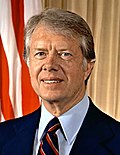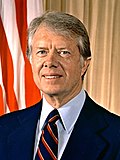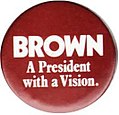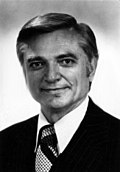Primary race
At the time, Iran was experiencing a major uprising that severely damaged its oil infrastructure and greatly weakened its capability to produce oil. [4] In January 1979, shortly after Iran's leader Shah Mohammad Reza Pahlavi fled the country, lead Iranian opposition figure Ayatollah Ruhollah Khomeini returned from a 14-year exile and with the help of the Iranian people toppled the Shah which in turn led to the installation of a new government that was hostile towards the United States. [4] The damage that resulted from Khomeini's rise to power was soon felt throughout many American cities. [4] In the spring and summer of 1979 inflation was on the rise and various parts of the country were experiencing energy shortages. [5] The gas lines last seen just after the Arab/Israeli war of 1973 were back and President Carter was widely blamed.
President Carter's approval ratings were very low—28% according to Gallup, [6] with some other polls giving even lower numbers. In July Carter returned from Camp David and announced a reshuffling of his cabinet on national television, giving a speech whose downcast demeanor resulted in it being widely labelled the "malaise speech." While the speech caused a brief upswing in the president's approval rating, the decision to dismiss several cabinet members was widely seen as a rash act of desperation, causing his approval rating to plummet back into the twenties. Some Democrats felt it worth the risk to mount a challenge to Carter in the primaries. Although Hugh Carey and William Proxmire decided not to run, Senator Edward M. Kennedy finally made his long-expected run at the presidency.
Ted Kennedy had been asked to take his brother Robert's place at the 1968 Democratic National Convention and had refused. He ran for Senate Majority Whip in 1969, with many thinking that he was going to use this as a platform for the 1972 race. [7] However, then came the notorious Chappaquiddick incident that killed Kennedy's car passenger Mary Jo Kopechne. Kennedy subsequently refused to run for president in 1972 and 1976. Many of his supporters suspected that Chappaquiddick had destroyed any ability he had to win on a national level. Despite this, in the summer of 1979, Kennedy consulted with his extended family, and that fall, he let it leak out that because of Carter's failings, 1980 might indeed be the year he would try for the nomination. Gallup had him beating the president by over two to one, but Carter remained confident, famously claiming at a June White House gathering of Congressmen that if Kennedy ran against him in the primary, he would "whip his ass." [8]
Kennedy's official announcement was scheduled for early November. A television interview with Roger Mudd of CBS a few days before the announcement went badly, however. Kennedy gave an "incoherent and repetitive" [9] answer to the question of why he was running, and the polls, which showed him leading the President by 58–25 in August now had him ahead 49–39. [10] Meanwhile, U.S. animosity towards the Khomeini régime greatly accelerated after 52 American hostages were taken by a group of Islamist students and militants at the U.S. embassy in Tehran and Carter's approval ratings jumped in the 60-percent range in some polls, due to a "rally ‘round the flag" effect [11] and an appreciation of Carter's calm handling of the crisis. Taking advantage of Kennedy's separation from his then-wife Joan, one notable campaign bumper sticker from the 1980 campaign read "Vote Jimmy Carter, Free Joan Kennedy." [12]
Kennedy was suddenly left far behind. Carter beat Kennedy decisively in Iowa and New Hampshire. Carter decisively defeated Kennedy everywhere except Massachusetts, until impatience began to build with the President's strategy on Iran. When the primaries in New York and Connecticut came around, it was Kennedy who won.
Momentum built for Ted Kennedy after Carter's attempt to rescue the hostages on April 25 ended in disaster and drew further skepticism towards Carter's leadership ability. [13] Nevertheless, Carter was still able to maintain a substantial lead even after Kennedy won the key states of California and New Jersey in June. Despite this, Kennedy refused to drop out, and the 1980 Democratic National Convention was one of the nastiest on record. On the penultimate day, Kennedy conceded the nomination and called for a more liberal party platform in the Dream Shall Never Die speech, considered by many as the best speech of his career, and one of the best political speeches of the 20th Century. [14] On the stage on the final day, Kennedy for the most part ignored Carter.
This page is based on this
Wikipedia article Text is available under the
CC BY-SA 4.0 license; additional terms may apply.
Images, videos and audio are available under their respective licenses.

















